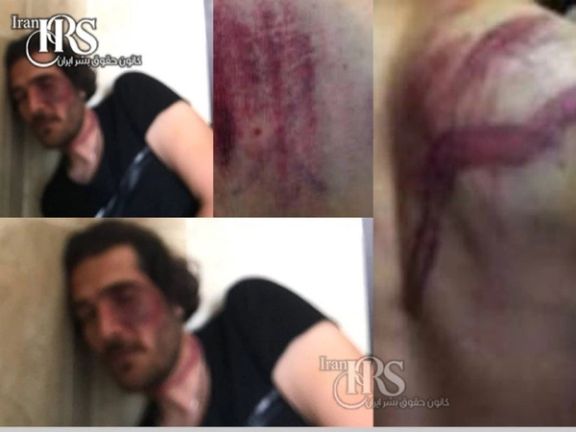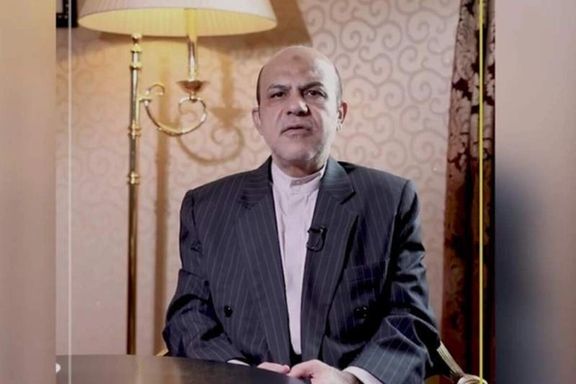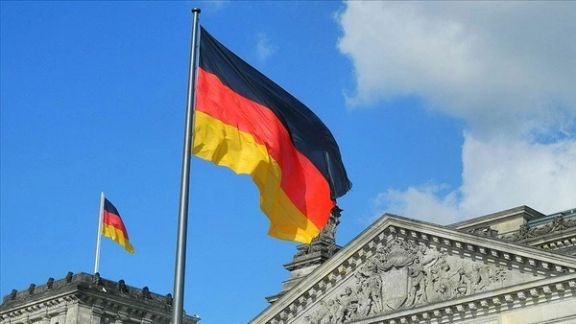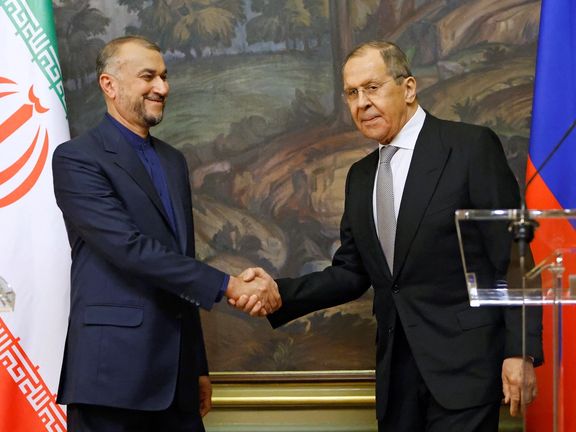Two Iranian Protesters Slip Into Coma In Detention

Reports by Iranian human rights activists indicate that a detained protester in Shahr-e Rey south of Tehran has gone into coma due to severe torture.

Reports by Iranian human rights activists indicate that a detained protester in Shahr-e Rey south of Tehran has gone into coma due to severe torture.
Activists say Hassan Firouzi fell into coma on Friday because of torture, bleeding and lack of access to treatment.
The-34-year-old man was brutally tortured after being arrested during recent protests, according to human rights organizations, and a revolutionary court sentenced him to death.
Iran Human Rights Monitor, a non-political France-based organization that reveals human rights violations in Iran, announced January 16 that Hassan Firouzi had said his "only wish" was to see his daughter before execution.
The report says Hasan Firouzi suffered severe bleeding after torture and beatings by interrogators with a chair, and while he lost his left kidney, no treatment was provided to him.
Meanwhile, the lawyer of one of the detained protestors in Khorramabad in Western Iran said his client fell into coma due to an infection from injuries he sustained during the arrest.
"My client, Mohammad Ekhtiarian, one of the detainees in recent protests, is in a coma due to the infection of the wounds caused during the arrest," he wrote on his Instagram page.
According to Iran's Prisons Atlas, Mohammad Ekhtiarian is a bodybuilder and during the nationwide protests following the death of Mahsa Amini in police custody, he was wounded in the leg after being shot by the security forces and then arrested.

Leaked documents show that Iran’s ministries of agriculture, communications, and industry have in separate letters requested to have access to unrestricted internet.
The letters by government institutions show that the "classification of the Internet in Iran" is expanding at an unprecedented speed. This means while the public has very restricted access, officials are able to have full access.
In one of these letters, an official at the agriculture ministry asked the communications ministry to provide "free, unfiltered and high-speed" internet to some people listed in the letter.
He also included his own phone number in the list, saying that one of the reasons for the request is to "monitor the news in cyberspace"; an activity that ordinary people are deprived of due to restrictions imposed on social networks and Farsi news websites based abroad.
In another letter signed by Omid Qalibaf, advisor to the minister and Spokesperson of the Ministry of Industry, has sent his number asking the communications ministry to activate unrestricted internet on his mobile phone.
On the same day, Mohammad Ehsan Kharamid, the head of the Public Relations Center of the Ministry of Communications, sent a letter to the National Center for Cyberspace, requesting that the attached phone numbers be granted "Journalists Internet" which has no restrictions.
Since 2016, journalists close to the regime have unrestricted access to the Internet, while the government filtered more apps and websites during protests in recent months.

Iran's intelligence ministry claims top officials were unanimous in the execution of British-Iranian Alireza Akbari earlier this month for “spying for Britain.”
In a statement Friday, the ministry said there is no rift among top officials over the execution of Alireza Akbari, a former Iranian defense minister, on charges of “corruption on earth” and “extensive activities against the country’s internal and external security” through espionage for the British government’s spy agency. The statement claimed that “officials, media, and political groups” unanimously endorse the execution.
“The ministry resolutely announces that the country’s officials and political groups loyal to the Islamic Republic may have differences over domestic issues (which is natural) but are united in their view over the wickedness of the British regime and its hostility against this country and people,” the statement said. It also claimed that Iran had dealt a “great blow” to the British intelligence by executing their agent.
Akbari once served as deputy to current secretary of the Supreme National Security Council (SNSC), Ali Shamkhani, when he was defense minister in the government of the reformist President Mohammad Khatami (1997-2005).
The announcement of Akbari’s execution led to strong Western condemnations and fueled already existing rumors about Shamkhani’s power struggle with hardliner opponents and the possibility of his replacement. A source close to the Revolutionary Guards (IRGC) told Iran International that this was a move to weaken Shamkhani’s position and oust him.
A day before the execution, Nour News, a website close to the SNSC, accused “radical circles” of “spreading rumors” and on January 16 published a statement by the defense ministry which said Akbari had never “served as a deputy minister” and had retired in 2002 as head of the ministry’s Defense Research Bureau.
The ministry also blamed Britain for encouraging Akbari and using his weaknesses to lead him to treason and betrayal of his country. The ministry said Akbari had provided the British intelligence service with secret information over the country’s military and missile projects, ways of circumventing sanctions, information on security, defense and political entities as well as Iran's nuclear scientist Mohsen Fakhrizadeh who was assassinated near Tehran in November 2020.
Before Akbari’s execution, Iran's state media aired a program that included a video of his so-called “confessions” in which he said he was recruited by the British intelligence service that provided him with a laptop that would directly and securely connect to them, and helped him plan his escape from Iran, get a UK investment visa, and eventually, British citizenship.
Such taped ‘confessions’ by prisoners are routinely obtained by Iranian intelligence under torture, threats and pressures. It is also not clear if Akbari was an agent why he openly returned to Iran in 2019.
In the video, Akbari did not confess to involvement in the assassination but said a British agent had asked for information about Fakhrizadeh.
Akbari managed to smuggle an audio recording from Tehran’s notorious Evin Prison where he was held for three years, often in solitary confinement, since his arrest in 2018. In the audio file he claimed to have been tortured physically and psychologically for 3,500 hours and forced to take psychedelic drugs to confess to crimes he had never committed.
“They broke my will, drove me to madness and forced me to do whatever they wanted,' he said in the audio file, claiming that pressures on him included pointing a gun to him and threatening to kill him.
The United States, Britain, and European Union have strongly condemned Akbari’s execution and vowed not let Tehran’s violence go “unpunished”.

German foreign ministry says the authorities of the Islamic Republic have denied the arrest of a German citizen in Iran reported earlier this week.
In response to Iran International, the German foreign ministry denied the arrest of one of its nationals in Iran, saying “the issue was raised in Iranian media, but after consultations with Iranian authorities, we realized this is not true.”
This ministry had earlier issued a statement following a report by Jam-e Jam daily announcing that the German embassy in Tehran is working hard to make this issue clear.
Jam-e Jam daily, which is owned by Iran's state broadcaster, reported Tuesday that a German national was arrested while taking photos of Omidiyeh oil facilities in the southern Khuzestan province.
A number of European citizens are imprisoned in Iran, but only the names of some of them have been published.
Irish-French prisoner Bernard Phelan is another foreigner arrested on October 3 during anti-regime protests that have swept the country following the death of Mahsa Amini in police custody on September 16.
He has been on hunger strike since the beginning of the New Year, but on Friday he accepted to eat upon the request of his family.
However, Phelan warned if there is no improvement in his situation, he will go on hunger strike again.
Earlier in the month, the Islamic Republic’s judiciary sentenced Olivier Vandecasteele, who was detained in 2022, to 40 years in prison and 74 lashes for alleged “spying and cooperation with the United States, money laundering and currency smuggling $500,000 out of Iran.”

Iran’s foreign minister claims the Islamic Republic does not recognize Russia's annexation of occupied Ukrainian territories.
In an interview with TRT World, Hossein Amir-Abdollahian said Thursday that despite good relations between Moscow and Tehran, Iran still does not recognize the annexation of Ukrainian territories.
"We recognize the sovereignty and territorial integrity of countries within the framework of international laws, therefore, despite the excellent relations between Tehran and Moscow, we did not recognize the occupation of Crimea, Luhansk, and Donetsk regions," the minister said.
He also claimed that the Islamic Republic opposes the war and hopes for peace in Ukraine.
“When we say that the conflict in Ukraine is not a solution, we believe in our position as a fundamental political principle on which we rely," Amir-Abdollahian said.
His comments came at a time when Tehran signed a trade agreement with the authorities of the self-proclaimed Donetsk Republic back in June.
"At the Saint Petersburg International Economic Forum, the Donetsk People's Republic Chamber of Commerce and Industry and Farnoush Trade, an Iranian Commercial House, signed an agreement that will promote the development of trade and economic relations between our Republic and the Islamic Republic of Iran," wrote Donetsk President Denis Pushilin on social media in June.
However, the Islamic Republic denied the reports.
Iran’s regime is providing military support to Russia in its war against Ukraine by supplying Moscow with kamikaze drones. The US and some other Western countries have imposed sanctions against Tehran for providing the drones that target civilian infrastructures in Ukraine.

Iran’s sports minister has ordered an investigation into alleged sexual abuse of minors at a football school in the northeast of the country.
In a statement on Saturday the sports ministry said Minister Hamid Sadjadi ordered an investigation two weeks ago following reports of sexual abuse at a teenage boys’ football school in the religious city of Mashhad.
A former media manager for the Shahr Khodro football team said on social media that the parents of 15 players from this club have filed a complaint against the club and coaches for sexual assault on their children, reported IRNA Friday.
Shahrara daily, which is affiliated to Mashhad municipality, reported Friday that “families of the children had gathered in front of the headquarters of the provincial football organization to protest this tragedy.”
Since there was no follow-up by the authorities, the families were forced to publicize the case through media, the daily added.
Sexual abuse has made footballschools a serious threat for children and teenagers. Reports say even some mothers of the children receive sexual offers from the coaches and officials of these schools.
Reza Torabian, a former football player, had earlier said that “Some officials of football schools, ask the single moms to have sex in return for letting their kids play in famous teams.”
Sexual abuse of children and teenagers in football schools is not officially reported, but in the last two decades, Iranian media have published numerous reports of child abuse in football schools.